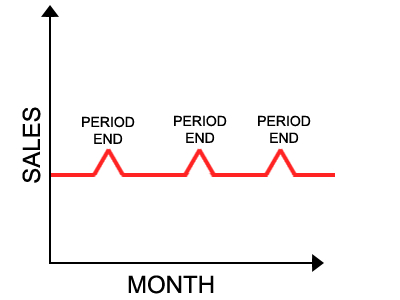Businesses either have too many sales or not enough. Take WeVeel, a Morrisville, PA based business, it sells the Scentos brand of scented markers, paint and other toys for children. It was ranked #500 on the Inc. 500 last year, with a three year growth of 913% at $10.3m in sales. WeVeel isn’t worried about sales, in the sense that it’s main priority is satisfying demand.
But most businesses, and there are 27.3 million of them in the US, struggle with growth. Meeting payroll is a constant challenge. Sales growth is not consistent.
Is it because customers and prospects in your sector have stopped spending money? Certainly some industries are more cyclical than others e.g. recruitment, construction, semi-conductor industries, and travel are good examples.
However in many industries, companies are losing market share with accompanying anemic sales growth, because they’ve lost touch with their customer’s needs. The customer is spending money but just not on you. This is a far more complicated problem to solve, than it first appears.
For example, asking your customer what they need, often gets the reply that they are all set! Recruiting higher quality sales professionals will fail if your product offering is solving a problem that isn’t a priority. Producing the best product in the world will also fail, if your story telling is not being heard by your target audience.
The key to a consistent sales performance is to build constant curiosity and the skills of an investigative journalist into the sales team. Sometimes you need to step back as the leader of your business and assess whether you are in tune with your customer’s needs. At some point in the lifecycle of companies there is always a need to hit the reset button. Because customer’s needs, pains, desired outcomes change. Look at the necessary repositioning being one by some of biggest names in business including GE, IBM, Staples and HP.
Is it time for your team to hit the reset button or can you “tweak your way” to a better positioning and value proposition that the customers love.
It all starts by executing a constant deep dive into the world of your customers. Who does it? Your sales team, supported by the product management team, trained in a diagnostic frame of mind. By deploying a diagnostic set of questions with your prospects, including existing customers, you will garner respect that you understand their world. Sales professionals are defined by the questions they ask, not by their product knowledge (which is assumed to be comprehensive anyway).
By building smart questions relevant to that prospect in that industry, you show you care about that person’s success, their priorities and the health of their business. Smart questions uncover the following:
- Who needs to be involved in making decisions?
- What symptoms exist that may have costly consequences?
- What are the causes of today’s problems?
- What are the priority issues that need addressing?
- How does your unique value proposition produce the desired outcomes for that prospect?
- And why is your solution more relevant than the competition and offer a superior ROI?
This insight, coupled with your marketing intelligence will force you to fine tune your product strategy, your value proposition and the narrative that will resonate in the market, segment by segment.
Companies that possess real insight into their customer’s world, rarely struggle to generate record sales growth.
Comments welcome below.
Always reachable at Ian@TPPBoston.com.








